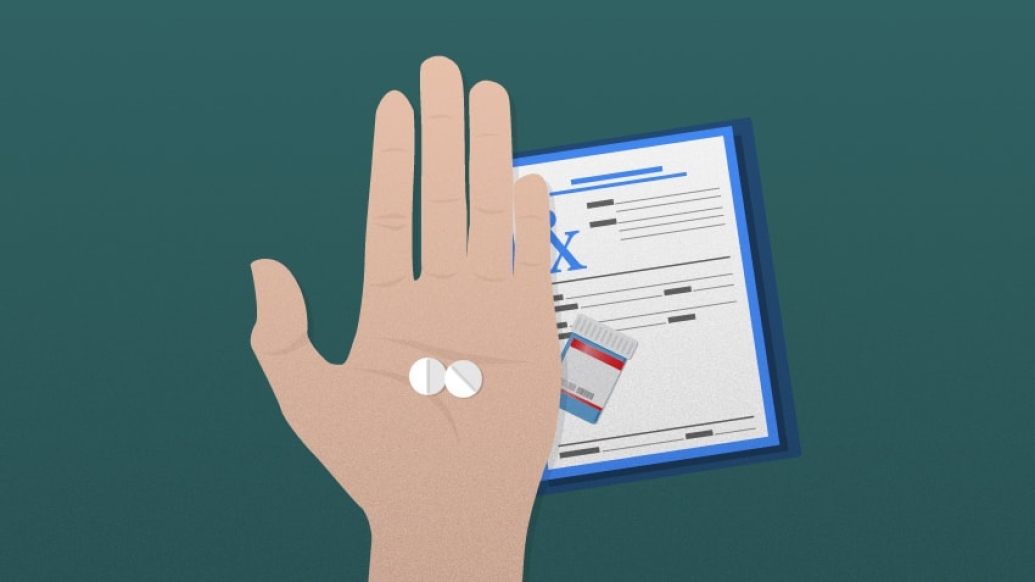A new drug policy was meant to curb unnecessary opioid prescriptions. Instead, a new study finds, prescriptions after surgery went up.
7:00 AM
Author |

As the nation's opioid addiction epidemic worsened, the federal Drug Enforcement Administration placed some prescription painkillers in a tougher-to-refill category.
While the step was well-intentioned, it may have led to more opioids — not fewer — being given to patients by surgeons after routine operations.
LISTEN UP: Add the new Michigan Medicine News Break to your Alexa-enabled device, or subscribe to our daily audio updates on iTunes, Google Play and Stitcher.
The DEA's 2014 action to move opioid painkillers to a more restrictive class "was not correlated with a drop in prescribing following elective procedures as we would have expected," says Jennifer Waljee, M.D., a Michigan Medicine plastic surgeon who also co-directs the Michigan Opioid Prescribing Engagement Network.
In a study in JAMA Surgery, Waljee and her team observed that the amount prescribed rose under the new law, despite more stringent regulations. Although the reasons for this are not clear, it is possible that prescribers were concerned about inadequate pain control and difficulty obtaining any needed refills.
Opioid use for postoperative pain control is thought to be a major gateway to addiction.
In the absence of data regarding how much patients actually use, prescribers may have prescribed more upfront to avoid the risk of patients running out.Jennifer Waljee, M.D.
New policy shifts course
In their research, Waljee and her colleagues at U-M's Institute for Healthcare Policy and Innovation tracked opioid prescription patterns before and after the DEA's ruling that moved hydrocodone (Vicodin), the most commonly prescribed opioid after surgery, from schedule III to the more restrictive schedule II.
The change meant that doctors could prescribe only a 90-day supply — and they couldn't prescribe by telephone or fax.
MORE FROM THE LAB: Subscribe to our weekly newsletter
Data on nearly 22,000 privately insured patients in Michigan undergoing common surgeries such as knee replacement and cancer treatment showed that the number of hydrocodone prescriptions actually rose after the new rule.
Although prescription refill rates went down, the number of opioids filled increased by seven tablets per patient after the DEA change.
"The effect of these policies cannot always be predicted," says Joe Habbouche, M.D., a surgery resident at Michigan Medicine and the study's co-author. "It is possible that these restrictions limited the ability to prescribe extra pain medications after patients are discharged, if needed.
"In the absence of data regarding how much patients actually use, prescribers may have prescribed more upfront to avoid the risk of patients running out."
Striking a balance
Just how much pain medicine a patient will need to help with post-surgery recovery has always been murky. Surgical teams have lacked an evidence-based guide to help gauge the amount needed for acute pain.
To help, Michigan surgeons developed an opioid prescribing tool in 2017 that lists prescription amounts for 11 common operations, with each recommendation supported by surgical quality research plus patient data and surveys.
SEE ALSO: For 1 in 10 Cancer Patients, Surgery Means Opioid Dependence
Future opioid-related policies and regulations should include a similar research-based approach and close follow-up to determine if they're working, the research team says.
Likewise, the approach ought to be collaborative.
"Different types of physicians and health professionals should be involved in the policymaking surrounding opioid prescribing, especially for prescribing in different settings," Habbouche says. "Our work suggests patient and physician education about opioids is critical."

Explore a variety of healthcare news & stories by visiting the Health Lab home page for more articles.

Department of Communication at Michigan Medicine
Want top health & research news weekly? Sign up for Health Lab’s newsletters today!





